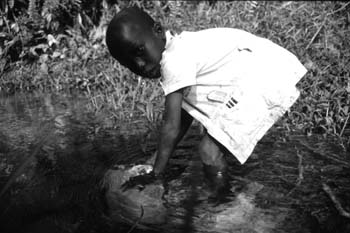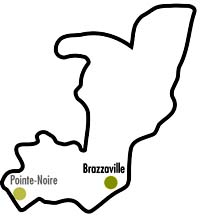
KEY FACTS
Population: 3.9 million
GDP per capita: US$ 688
Population below poverty line: N/D
Composition of economy: agriculture 7.4%, industry 52%, services 40.6%
Total land area: 342 000 sq km, bordering Angola, Cameroon, Central African Republic, Democratic Republic of the Congo, and Gabon
Total arable land: 0.51%
Life expectancy: male: 48 years; female: 50 years
Literacy rate: male: 89.6%; female: 78.4%
Human Development Index: 142/177
(Source: UN; World Bank; CIA Factbook)

FAO IN REPUBLIC OF CONGO
In 2006, FAO's proposed assistance for the Republic of Congo will support vulnerable conflict-affected populations, including female-headed households, ex-combatants and returnees.
Background
The Republic of Congo has been subject to repeated armed conflicts over the past decade, which have destroyed the country’s infrastructure and access to basic human services such as health care and education. There are at least 100 000 displaced persons in the country as well as thousands of ex-combatants, among them numerous child soldiers. Some 58 000 refugees still reside in neighbouring Democratic Republic of Congo and are expected to return when the situation stabilizes.
In spite of a peace accord signed in 2003, remnants of civil war militias are still active in the southern Pool region. Most of the rebels have yet to disarm and many have turned to banditry. However, recent political developments and a planned process of disarmament, demobilization and reintegration, executed by the United Nations Development Programme (UNDP) and financed by the European Union, may have a beneficial impact on the entire operational environment and permit access by humanitarian groups to the most vulnerable populations.
The overall situation is exacerbated by the spread of the deadly Ebola virus and by occasional devastating floods.
Needs analysis: Food security and agriculture sectors
The repeated armed conflicts that the Republic of Congo has experienced during the last decade have worsened the country's food crop production, which is currently below consumption requirements. Less than one percent of the 10 million hectares of arable land are exploited, thus resulting in increased food imports. Some local food products are very expensive and access to food for populations with minimal purchasing power is limited. Food insecurity is worsened by the destroyed road system and interruptions of the railway traffic. Furthermore, agricultural assistance is required to support the returns of tens of thousands of refugees, most of whom lack basic productive assets.
In the Pool, Bouenza and Lekoumou regions, the Manioc Mosaic virus has deprived several households of their main source of revenue and of a basic food. This virus has reached the plateau regions and is likely to continue to spread if measures are not taken quickly.
The deadly Ebola virus continues to spread through human contact with meat from wild animals, an important source of protein in the absence of livestock.
In this context, FAO’s proposed assistance will support vulnerable conflict-affected populations, including female-headed households, ex-combatants and returnees, through the provision of improved seeds and seedlings, support to income-generating activities (livestock rearing, fisheries, nurseries) and the reinforcement of technical skills. The mitigation of the Ebola virus will be targeted by ensuring access to food crops and animal protein through support to short-cycle crops, livestock rearing (sheep, goats, poultry) and fisheries production.
PROPOSALS
FAO RELIEF AND REHABILITATION ASSISTANCE
Funding
required: US$ 1 365 740
|
Support to short-cycle breeding and to fish farming in areas exposed to Ebola outbreaks |
Issues addressed: Populations of the department of Western Cuvette are frequently infected by the deadly Ebola virus, transmitted through consumption of wild animals.
Objectives: Ensure an adequate supply of animal protein through livestock products in order to protect populations from Ebola breakouts.
Activities: Promotion of breeding of small ruminants, poultry and fish, as well as procurement of necessary inputs including animals, fry, hatcheries and fisheries, as well as the formation and training of producer groups. An awareness-raising campaign on Ebola will also be conducted.
Beneficiaries: 10 000 vulnerable persons (6 000 women and 4 000 men)
Implementing partners: Ministry of Agriculture, Livestock and Fisheries, WFP and international NGOs.
Duration: January 2006 - December 2006.
Funds requested: US$ 440 500.
|
Provision of essential agricultural inputs to vulnerable populations affected by the crisis in Pool region |
Issues addressed: Internally displaced people returning to their villages are confronted with the destruction of the entire socio-sanitary infrastructure, a lack of seeds, as well as other planting material and tools, and an almost complete destruction of both small and large livestock.
Objective: Increase agricultural production capacity of vulnerable populations in Pool region through capacity building, technical assistance and the supply of agricultural inputs.
Activities: Procurement of seeds (maize, groundnut, vegetables) and manioc cuttings. Reinforcement of technical and operational capacities of NGOs and other partners in development.
Beneficiaries: 100 000 (75 000 women and 25 000 men).
Implementing partners: Ministry of Agriculture, Livestock and Fisheries, WFP, national and international NGOs.
Duration: January 2006 - December 2006.
Funds requested: US$ 490 640.
|
Support to small livestock breeding and fish farming |
Issues addressed: The Pool region provides Brazzaville with most of its food. However, armed conflict has decimated almost all livestock causing a precarious food security situation, particularly affecting women.
Objectives: Increasing income and improve the food and nutritional situation of vulnerable populations through rehabilitating small livestock breeding and fish farming.
Activities: Promotion of breeding of small ruminants, poultry and fish, as well as procurement of necessary inputs including animals, fry, hatcheries and fisheries as well as the formation and training of producer groups. Veterinary kits and fodder will also be provided.
Beneficiaries: 2 000 households for sheep breeding, 4 000 households for goats, 10 000 households for village poultry production and 500 households for fish farming
Implementing partners: Ministry of Agriculture, Livestock and Fisheries, Ministry for the Promotion of Women, WFP, national and international NGOs.
Duration: January 2006 - December 2006.
Funds requested: US$ 434 600.